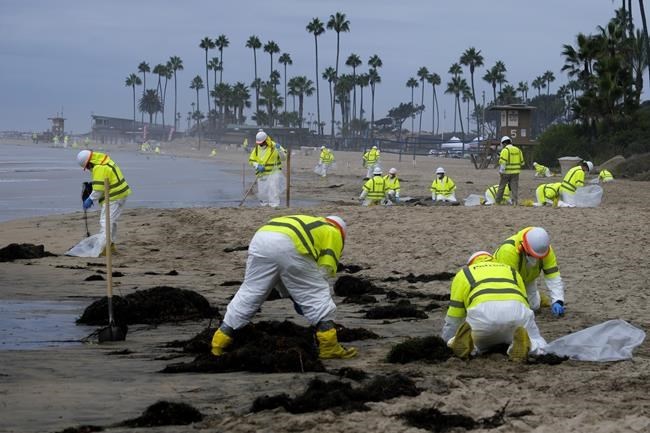LOS ANGELES (AP) — A Houston-based oil company and two subsidiaries were indicted Wednesday for a crude spill that fouled Southern California waters and beaches in October, an event prosecutors say was caused in part by failing to properly act when alarms repeatedly alerted workers to a pipeline rupture.
Amplify Energy Corp. and its companies that operate several oil rigs and a pipeline off Long Beach were charged by a federal grand jury with a single misdemeanor count of illegally discharging oil.
Investigators believe the pipeline was weakened when a cargo ship's anchor snagged it in high winds in January, months before it ultimately ruptured Oct. 1, spilling up to about 25,000 gallons (94,600 liters) of crude oil in the ocean.
U.S. prosecutors said the companies were negligent six ways, including failing to respond to eight leak detection system alarms over a 13-hour period that should have alerted them to the spill and would have minimized the damage. Instead, the pipeline was shut down after each alarm and then restarted, spewing more oil into the ocean.
Amplify blamed the unnamed shipping company for displacing the pipeline and said workers on and offshore responded to what they believed were false alarms because the system wasn't functioning properly. It was signaling a potential leak at the platform where no leak was occurring, the company said.
The leak, in fact, was from a section of undersea pipe 4 miles (6.4 kilometers) miles away, Amplify said.
“Had the crew known there was an actual oil spill in the water, they would have shut down the pipeline immediately," the company said.
The Associated Press first reported last week that Amplify's leak detection system was not fully functional. At the time, the company declined to explain what that meant.
AP in October reported on questions surrounding the company’s failure to respond to an alarm.
Meanwhile, the U.S. Coast Guard said Wednesday that it was responding to a report of a sheen off the coast of Bolsa Chica State Beach but hadn't determined the source and planned to fly over the scene Thursday morning.
The area is in the same general vicinity as that of the October leak, although the pipeline currently is out of service.
In that case, the first pipeline rupture alarm sounded at 4:10 p.m. Oct. 1, but the leak was not discovered until well after sunrise the next morning and reported about 9 a.m. Citizens on shore called 911 to report the strong smell of crude that first afternoon, and an anchored cargo vessel reported seeing a large sheen on the water before sunset.
Local authorities who went looking for a spill Oct. 1 didn’t find it. The Coast Guard said it was too dark to go out and search for the spill by the time they received a report about it. They went out after sunrise, finding it around the time the company reported it.
Just days after the spill, Amplify CEO Martyn Willsher had refused to answer questions at news conferences about the timeline surrounding the spill and a report that an alarm at 2:30 a.m. Oct. 2 alerted controllers about a possible spill. He maintained the company didn’t learn of the spill until a boat saw a sheen on the water at 8:09 a.m. that morning.
Orange County Supervisor Katrina Foley said the indictment validates residents who had detected the spill a day earlier and reported it.
“It’s terrible that they basically lied to the community during the press briefings and caused people to believe that what they saw with their own eyes or smelled or knew was actually not true,” she said. “What we know now is that the company knew this, and the alarms went off like they were supposed to, and nobody did anything.”
Even after the eighth and final alarm sounded, the pipeline operated for nearly an hour in the early morning, prosecutors said.
Pipeline safety advocate Bill Caram said the indictment paints a picture of a reckless company.
“I understand there are false positives on leak detection systems but this is our treasured coastline,” said Caram, director of the Bellingham, Washington-based Pipeline Safety Trust. “The fact that they kept hitting the snooze button and ignoring alarms, stopping and starting this pipeline and all the while leaking oil in the Pacific Ocean is reckless and egregious.”
Prosecutors also found that the pipeline was understaffed and the crew was fatigued and insufficiently trained in the leak detection system.
The indictment’s description of company personnel as fatigued pointed to a long-standing industry problem, said pipeline expert Ramanan Krishnamoorti with the University of Houston.
“Fatigue and overworked staff is old and trite and inexcusable,” he said. “This has been demonstrated over and over again as being the single most important vulnerability.”
It’s not clear why it took so long for the 1/2-inch (1.25-centimeter) thick steel line to leak after the apparent anchor incident, or whether another anchor strike or other incident led to the rupture and spill.
The spill came ashore at Huntington Beach and forced about a weeklong closure of the city’s beaches and others along the Orange County coast. Fishing in the affected area resumed only recently, after testing confirmed fish did not have unsafe levels of oil toxins.
If convicted, the charge carries up to five years of probation for the corporation and fines that could total millions of dollars.
___
Brown reported from Billings, Montana. Associated Press reporter Amy Taxin contributed.
Brian Melley And Matthew Brown, The Associated Press



